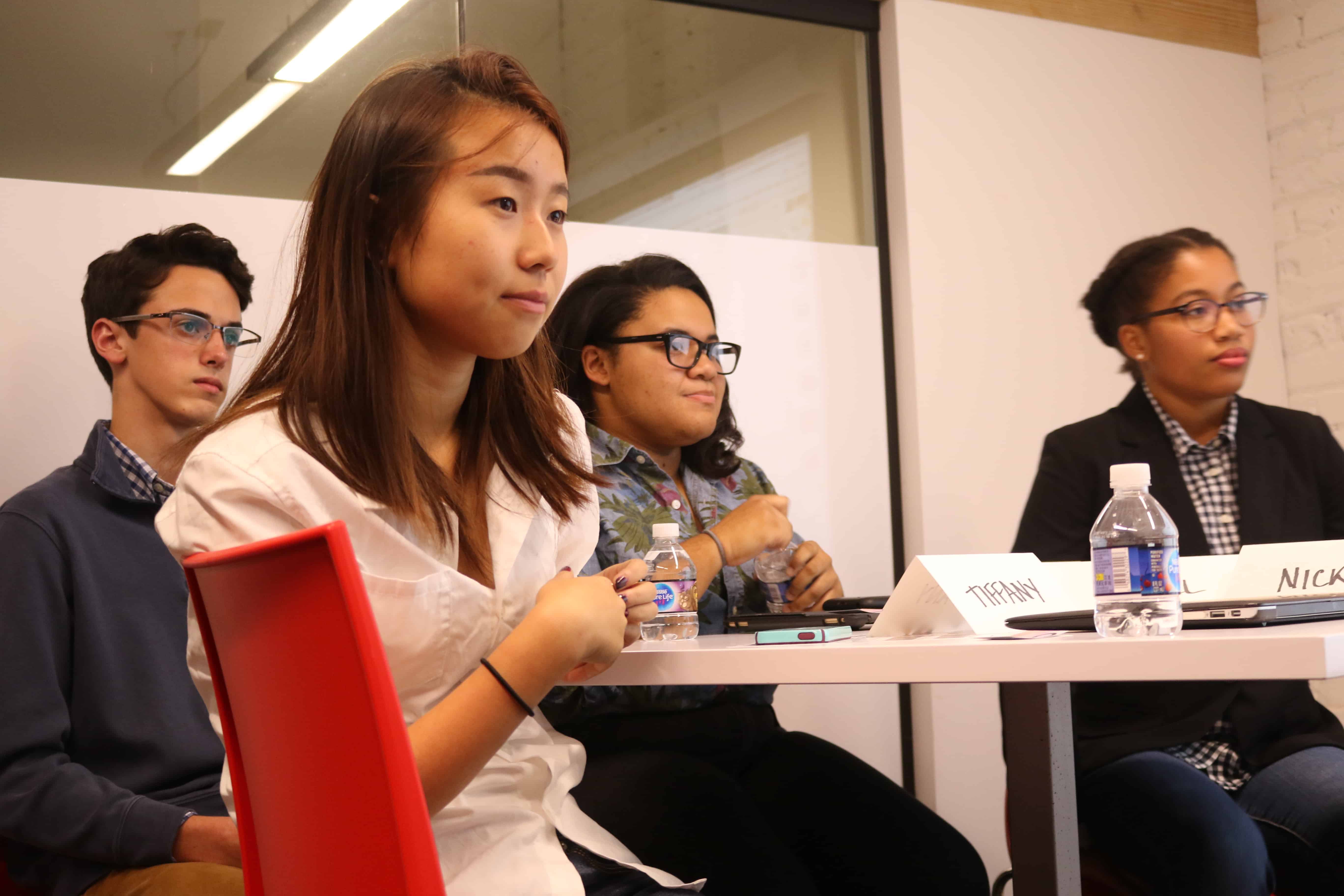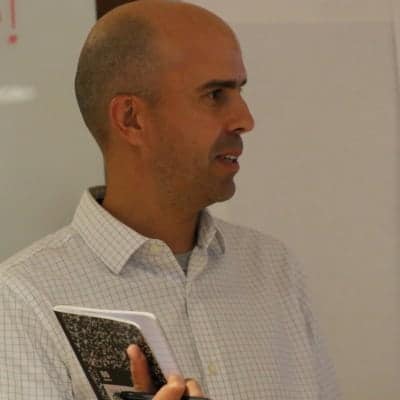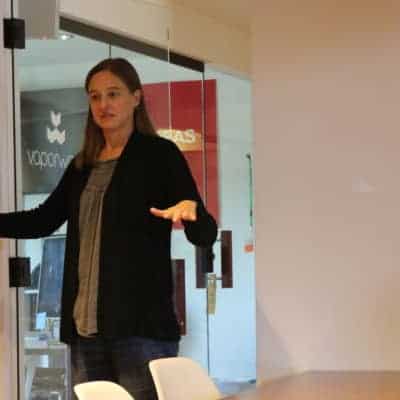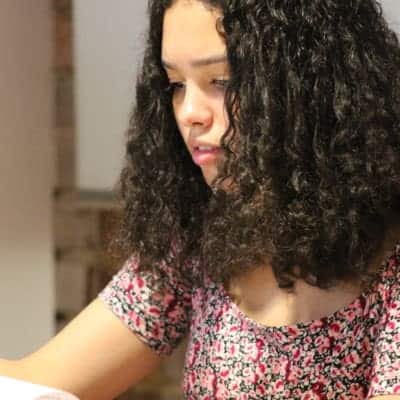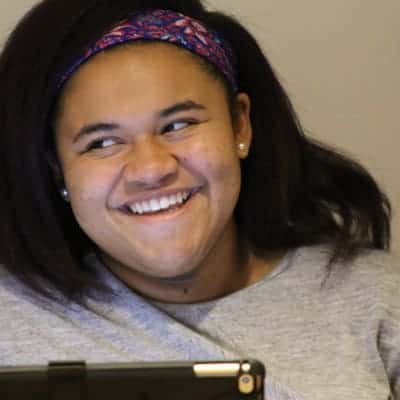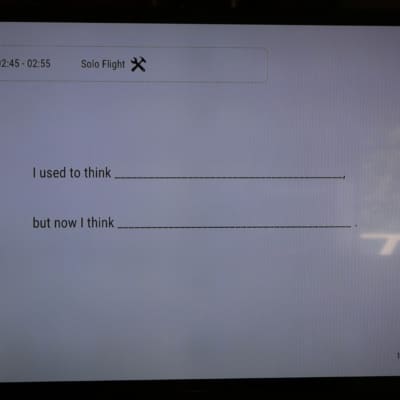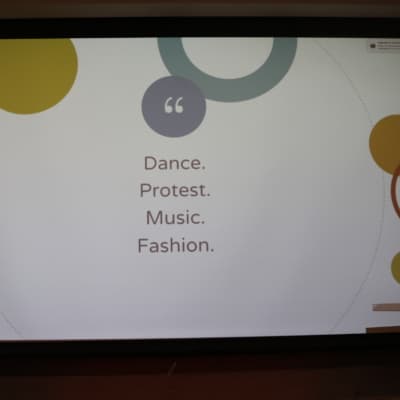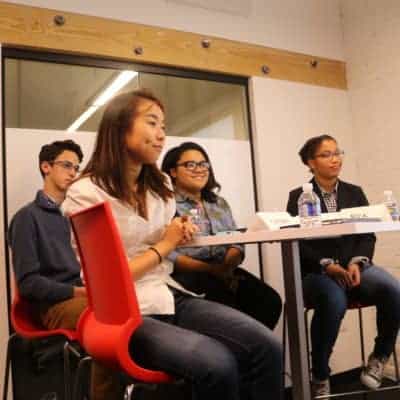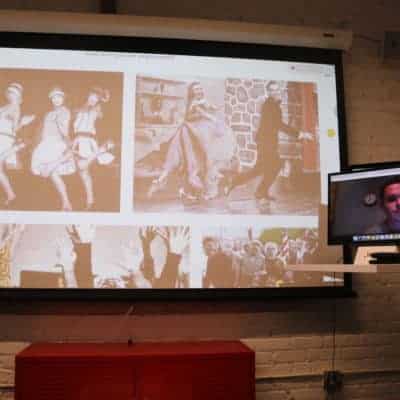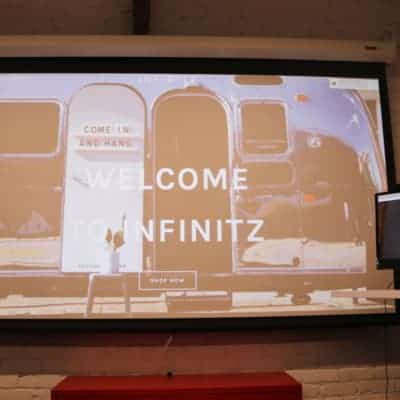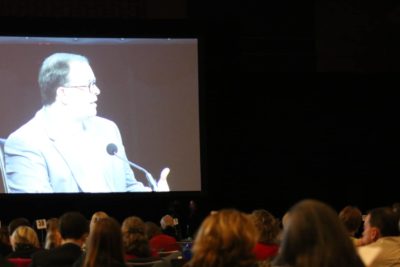“What is the problem that we think is most critical in education right now?” Dan Gonzalez asks. “It’s that we’re graduating students after 16 years of school unprepared for the skills and the mindsets they need to actually do the work that employers need them to do.” After years of working in education, Gonzalez and his wife, Anne Jones, developed a program called District C to partner local businesses with high school students.
District C, a nonprofit organization, takes students nominated by high schools throughout the Triangle, puts them in groups called “squads,” and introduces them to real-life businesses with real-life problems. Students receive training focused on teamwork, leadership, and design thinking before they tackle the presented problems. After weeks of research, development, and virtual collaboration, students pitch their ideas to the businesses and their peers and families.
Gonzalez and Jones have worked in classrooms and educational organizations. District C is the product of their combined experiences. “We feel like we’re ready to take the things that we’ve learned through all of our experiences and apply them in a new, important way,” Gonzalez said. “These kinds of mindsets, it’s not like you reach a point in your life where you’ve checked all the boxes and (are) like, ‘I’ve done that. I’ve accomplished that,'” Jones said. “You build the muscle over your life. The chance to model that for students is important.”
An introduction to design thinking
A handful of students who have never met before sat in a room of tables in the HQ space on Harrington Street in downtown Raleigh last October. They were trying to design the ideal game for their given partners. Gonzalez said to ask questions that get at who the person is. Don’t get stuck on one question, Gonzalez and Jones explained, ask another.
“You’re trying to get at something underneath that,” Jones said.
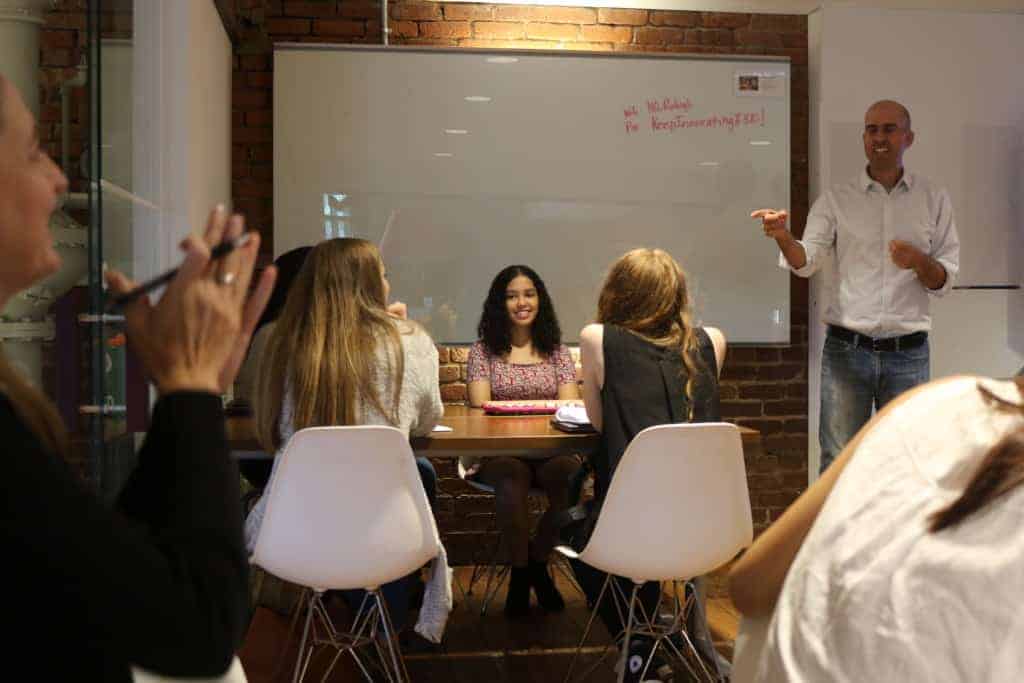

This idea was introduced on this first day, called “selection day,” but reinforced throughout the weeks of the program: do not directly ask the user what he or she wants — it is your job to figure that out. Instead, understand what makes the user tick. Get to know the user’s fears, motivations, preferences, annoyances, and go from there.
Students came from different educational settings and towns in the region with little to no idea of what selection day would be like. They did know, however, that not everyone would be selected to continue in the program. From observing students during activities and conducting interviews throughout the day, Jones and Gonzalez would decide who would be invited to the next stage.
The first phase of questioning in the game-designing activity was focused around asking about memories the partner has of a time they had a lot of fun playing a game. The second was aimed at discovering the emotions behind game-playing. Gonzalez paused every five or 10 minutes to switch the objective of the questions and highlight some moments he observed between partners.
“It took us two cycles of this but you’re starting to get somewhere,” Gonzalez said. He noticed one participant pausing and asking “why?” to her partner to dig deeper into his competitive nature. He praised another participant for asking Jones, who was playing along as a partner, if she ever does anything without Gonzalez.
Gonzalez then called for some “solo flight:” a short time to reflect individually on the gathered data and mark interesting bits. Next was a few minutes to start drawing conclusions from notes, then a few minutes to create a “defining statement:” what the user needs in a game.
Then it was time to brainstorm. Gonzalez encouraged students to get as many ideas — one idea per post-it note — on the table in five minutes. “The single goal is volume,” he said. “Keep your brain and pencil moving.”
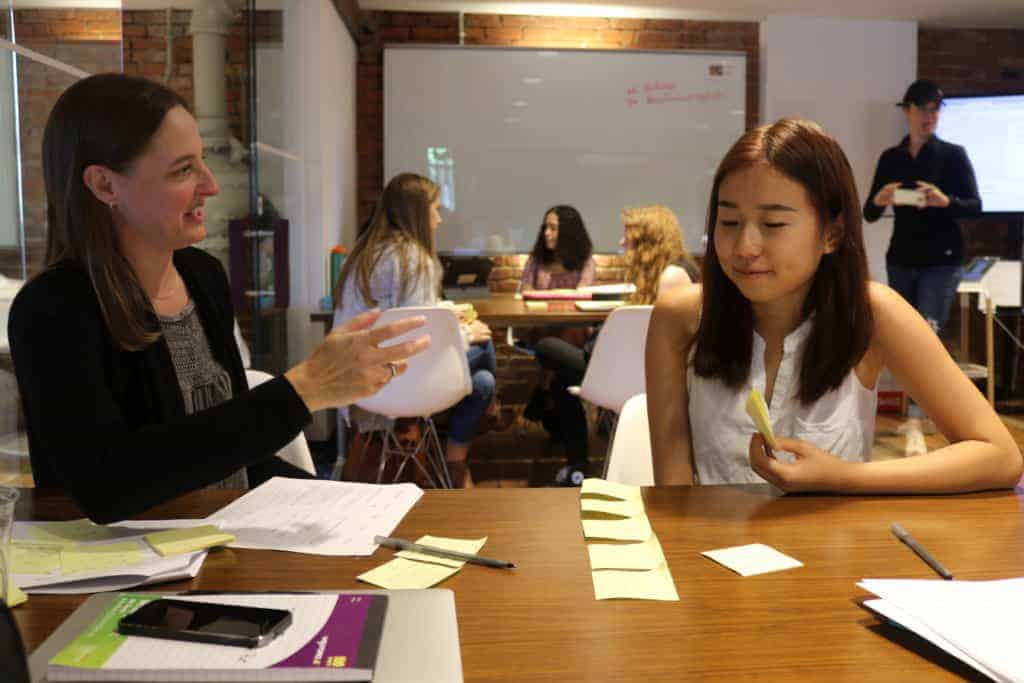

Students narrowed down their post-it notes, ran them by their partners, and started to develop a couple ideas, again asking partners how to make them better. With each round of input, Gonzalez stressed that it is not about whether you like the idea, it is about whether your partner does.
“Don’t become advocates of your ideas, be students of your ideas,” he said.
As Audrey Mullin left for the day, unclear whether she would move on to the next part of the program, she said the day felt worth her time either way.
“I was nervous before… I felt like this has been a really good learning experience,” Mullin said. “I learned a lot about teamwork — and not just like the big concept of it, but how to maximize it and make it the best that it can be.”
Erin Tyler said she felt the same nerves, coming in not knowing anyone or what to expect.
“My hands were shaking,” Tyler said. “I was really nervous. But as soon as you started getting into it, and especially when we read that packet on introverts, and how that affects leadership. I thought that was really helpful and really eye-opening for me, because I kind of think I’m an introvert. After that, it was easier to open up and do the activities and put my best self into the activities.”
Getting to know a business and its problem
“If you don’t like the name, change it,” said Jared Childs, founder of men’s retail start-up Pitch & Primer, to a group of students in a conference room. Childs decided to give two District C squads full license to rethink every aspect of his business. This is “launch day.”
“I want people to be like, ‘I’ve never experienced anything like this,'” Childs said.
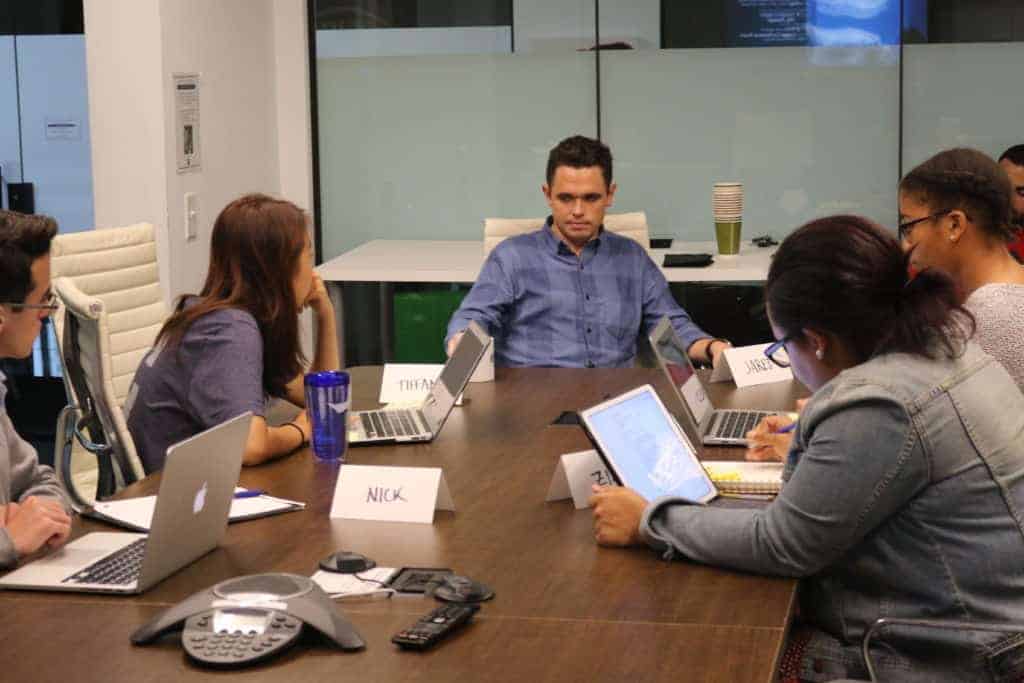

Pitch & Primer does not target Generation Z — the demographic cohort after millennials. But Childs wanted to know if and how it could. He simultaneously enlisted a group from N.C. State University’s entrepreneurship program and two District C squads to get a variety of generational takes of his ideas. He asked the District C high school students to create a mobile retail experience for Generation Z customers. Childs encouraged students to think outrageously and innovatively.
The squad members used their questioning tools from selection day to try to unpack Childs’s request. During a five-minute break in the interview, a group of students noticed they were asking questions that were too solution-based. They came back and asked Childs what his personal style was and to describe his ideal shopping experience.
Childs said he likes simple, classic pieces of clothing with an Americana aesthetic. He described what he looked for in customer service: “not aggressive,” “welcoming,” “opinionated,” “honest,” “knowledgable.” He said he would want to immediately be offered his favorite drink upon entering the store. He would want to hear the story behind the brands and products for sale. He described his dream dressing room, favorite music, and the feelings he would like to have leaving the retail experience.
Downstairs, two squads were delving into Ello Raw founder Becky Holmes’s past. Holmes created her organic bite-size snack company for a reason, she shared. In her childhood, Holmes’ family members had serious mental and physical health issues. After a bad breakup, Holmes started working out and realizing the strong connection between food and physical and mental well-being.
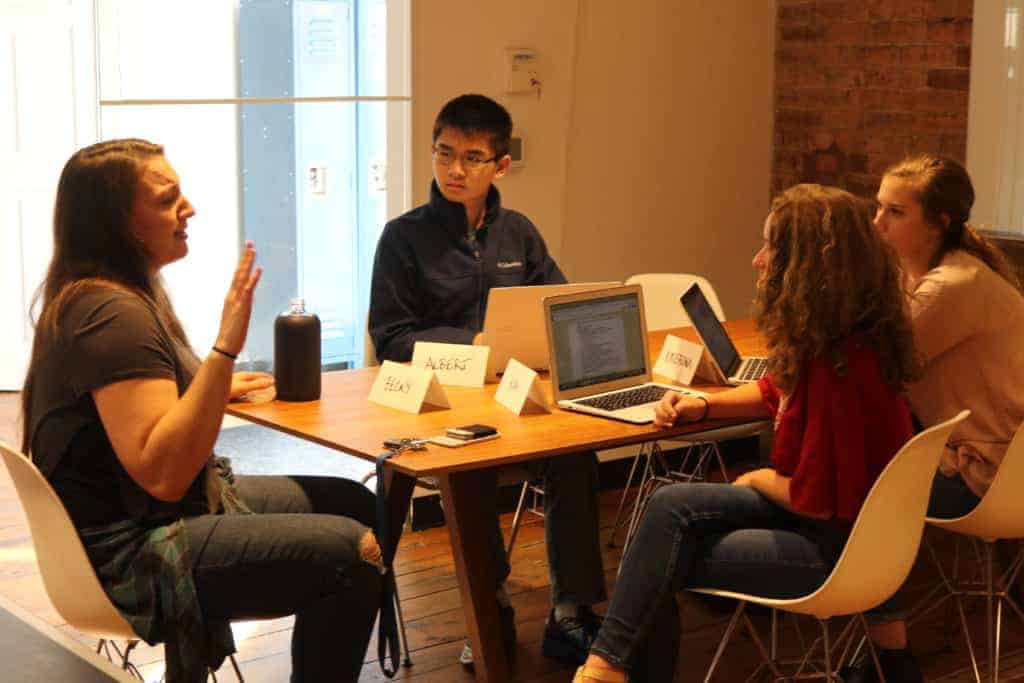

Holmes asked the squads to think of ways Ello Raw can make a difference using that motivation behind the products. She kept emphasizing that she wanted a campaign that was intentional and would create change for people. Holmes encouraged the students to ask: “Does this feel good or is it actually going to help someone?”
This was Holmes’s second time working with District C groups. Her first time around, she said her company came out of the process with ideas they did not have the time or perspective to imagine.
“One thing I’ve noticed is high schoolers are absolutely incredible and I think a lot of times companies think, ‘Okay, I want college interns,’ but my best in work that people have done have been high school interns,” Holmes said. “The world hasn’t closed them off to everything yet.”
Childs agreed, saying he wanted to tap into the creativity and openness of young people to inform his business decisions. “I feel like the younger you are, the more creative you are,” he said. “That was one aspect of it, was I knew they’d be really creative.”
Childs is also passionate about what District C can do for students. In high school and the beginning of college, he struggled academically. Once he was introduced to entrepreneurship later in college, doors started opening for him. Childs said he wanted to be involved in exposing students to experiential education at a younger age.
“It’s also a way to show them that you don’t have to take the path that everyone just expects you to take,” he said. “You don’t even have to go to college. You don’t have to get that corporate job and all that stuff. I feel like the younger you are to take a risk, the much better you’ll be, even if you fail.”
Pitch night
For about three weeks, squads have been meeting up, sometimes physically but mostly virtually, and collaborating on research and the creation of their pitches. One Wednesday evening, a squad working on its pop-up shop idea for Pitch & Primer met with Childs and Jones on a Google Hangout video conference.
Students said, through their research of a variety of clothing brands, they found the apparel should reflect Generation Z ideals: no categories or boxes, lots of authenticity and diversity, and online interactivity.
The squad was focused on running social media suggestions and questions by Childs, as he said that was an area where the company struggled. Students said creating hashtags for Generation Z customers to post with pictures wearing their Pitch & Primer clothing would give the company a chance to find and repost those pictures, empowering customers and creating a relationship with them.
Childs noticed the virtual direction the group was heading and made sure they felt comfortable in exploring that option.
“If you’re like, ‘They’ve got it wrong, they should be doing this, so the project should be more focused on online experience,’ you have creative control,” he said. “We can always make an in-store manifestation of an online experience.”
When the time for pitch night rolled around, most students were feeling some of the same nerves from the beginning of selection day. Rooms in HQ Harrington were filled with parents, siblings, former District C participants, classmates, and business owners.
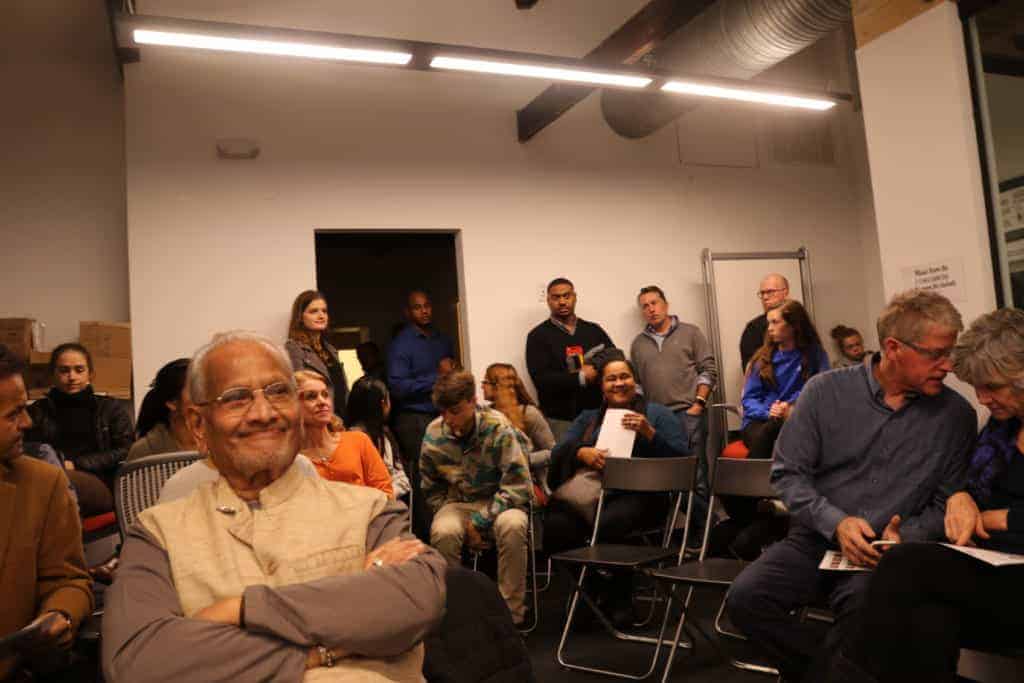

One squad presented to Childs on its vision for Pitch & Primer: a summertime pop-up retail experience called InfinitZ. The students focused on themes of expression, freedom, and community. On the walls of the mobile shop were images of teenagers from different generations using their voices through art, fashion, and protest. Throughout the store, the mirror represented the customer as both an individual and a member of a larger movement and community. That connectedness translated to the squad’s online strategy, which included a customer-generated picture wall and live style tips from employees through Instagram live chats.
“This just makes them feel more involved and recognized,” said Tiffany Jiang, a Ravenscroft School junior.
Finger foods around the store would appeal to more of the customer’s senses, students explained. Zia Cuthbertson, a junior at East Chapel Hill High School, added that as the store moves to different locations, the food will be provided by local caterers.
“Food invokes an atmosphere of comfort,” Cuthbertson said. “And by keeping it local, it allows for the possibility of the food coming from your hometown, which presents familiarity.”
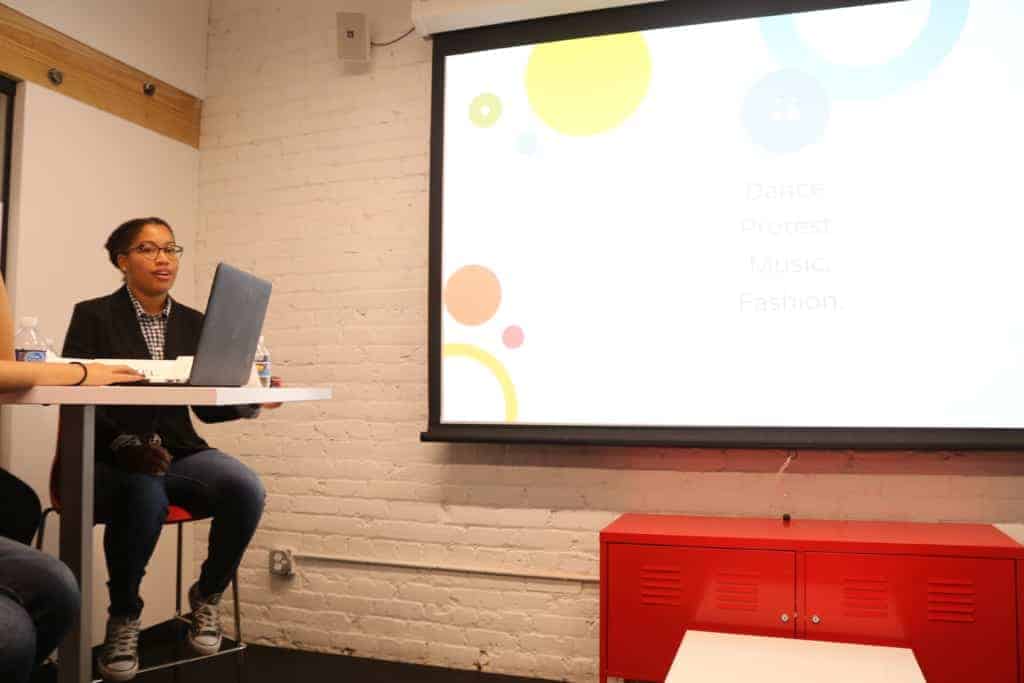

Students presented articles of clothing and brands as ideas for what would be sold through InfinitZ, focusing on four styles: streetwear, athletic, casual, and bohemian. They recognized, through interviews with peers and research of the market, that brand stories and quality matter to young people, as does a variety of sizing and fit options. Cuthbertson suggested M/F People, which offers unisex clothing. Generation Z, she said, does not want to be confined by labels.
Both Childs and members of the audience asked questions on Generation Z’s shopping habits. One attendee asked if young people still care about brick-and-mortar shops.
“It’s a complicated statistic because there’s a lot of power in seeing clothes first on social media and online, so you get a sense of what a store’s offering and how you can be represented in that brand, and if that brand fits you,” Durham Academy junior Angel Knight said. “It’s definitely more than half of shopping is done in-store still. People are more focused on researching before they go to a store, but that doesn’t mean they don’t go to stores.”
As four squads’ presentations wrapped up, Jones provided closing words to the entire group. Representatives from UNC-Chapel Hill and N.C. State told students about their entrepreneurship programs. Jones encouraged students and their families to continue working to “build the muscles” of questioning, learning, and working together in the next chapters of their lives.
“Imagine these students, the students before them, the students after them, imagine North Carolina being the number one state in talent recruitment for innovation, entrepreneurship, problem-solving, making a difference in your communities,” Jones said. “We’re going to get there.”
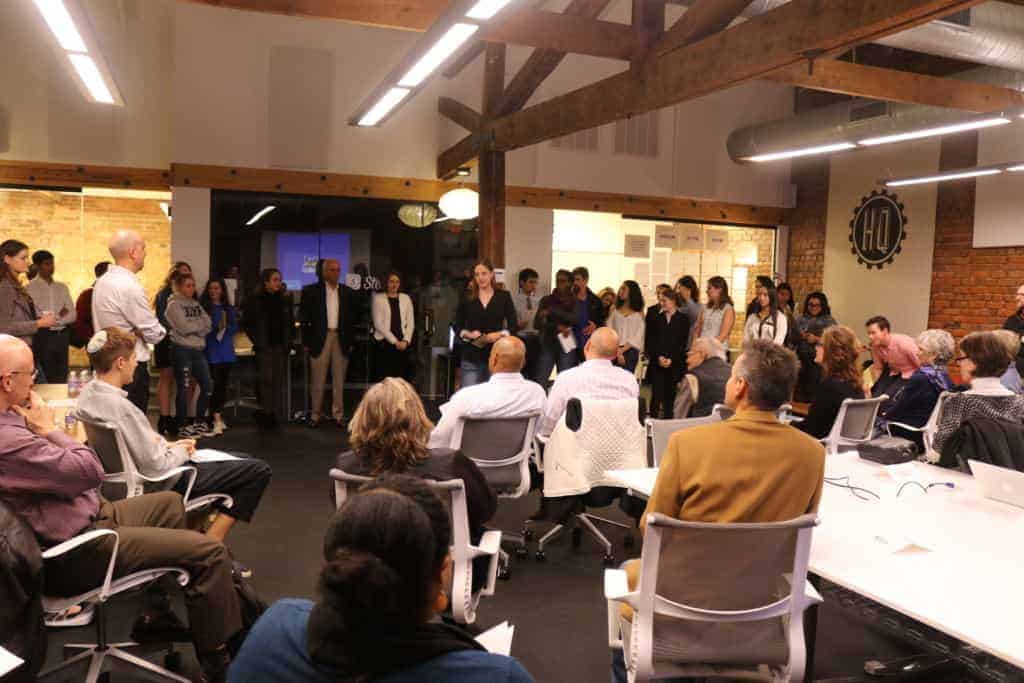

Jones and Gonzalez are working to expand the program to different areas of the state. “Our scale model revolves around a regional footprint,” Gonzalez said. He said they have an idea of the necessary resources and partnerships with schools and businesses to reach all 83 high schools in the Triangle region. Once that system works, the plan is to copy it elsewhere.
“Imagine a big circle around that region and put a dot in the center of it,” Gonzalez said. “You could imagine that region could serve students from an hour and a half way from that center dot, roughly. So imagine then figuring that out and replicating that in Charlotte, or replicating that in Wilmington, Asheville.”
The virtual aspect, Jones said, is what enables students from one or two hours away from the program hub to participate.
“I grew up outside of a small town,” Jones said. “I really understand the importance of giving access to kids in more rural areas. So hopefully this model will allow that access.”
Members of this fifth District C cohort said they took away big and small lessons from the program: how leadership can take many forms, how seemingly unrelated questions can uncover valuable solutions, how to work with different people effectively. Katerina Lamm, a senior at Voyager Academy Charter School, said she has found herself taking more time to think about a problem and its causes before trying to solve it immediately. Plus, she has since started using lists, agendas, “solo flight,” and brainstorming techniques in her everyday life.
“It’s just having different things like that, small things,” Lamm said, “that add up to a bigger impact.”
